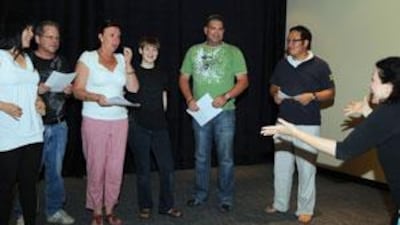DOHA // The actors were nearing the climax of Shakespeare's Twelfth Night when an unexpected guest interrupted the show. "I'd been on stage for 10 minutes when I heard this crashing noise," said Sherwynne O'Grady, an Australian schoolteacher who played a mother in the production. An SUV smashed into the theatre lobby. Then it exploded. "There was a tremendous boom," Ms O'Grady recalled. "The concussion was amazing, everybody was deaf for a few minutes and parts of the ceiling started falling down."
Five years ago today, an Egyptian suicide bomber struck the Doha Players Theatre. A dozen people were injured and the show's director, Jon Adams, who had hurried towards the auditorium doors to investigate the initial crash, was killed. The attack - Qatar's first and, as yet, only, terrorist bombing - pierced the nation's veneer of security. "My first reaction was to get out of the country," said Elaine Potter, the Doha Players' secretary at the time, now theatre administrator and producer. She attended the show with her nine-year-old daughter, but they left at the interval.
Ms Potter was not alone in her fear. In the days after the bombing embassies and international schools erected concrete barriers. Luxury hotels installed metal detectors to scan all guests and visitors. Worried about repeat attacks, a handful of Doha Players' members left Qatar, moving to Dubai or back home to Australia or the UK. Most returned within a year, according to Ms Potter, and resumed their former lives. Yet the Doha Players remains adrift.
Founded by a group of mostly British expatriates in 1954, the troupe performed irregularly at a variety of locations over the next quarter century, and its following grew. In 1979, the Emir, reportedly impressed with the members' commitment, offered them a permanent home at a 340-seat theatre on Al Wabra street. By the turn of the millennium the Doha Players had hit its stride, selling out productions of Shakespeare and fairy tale musicals, organising readings and community events and hosting well-known performers such as the Scottish actor and comedian Billy Connolly.
The bombing doused that momentum, took away one of the theatre's most prominent members and destroyed its home. In the next day's edition, The Gulf Times, Qatar's most popular English-language daily, declared "the end of the Doha Players". The theatre board convened an emergency meeting. "The decision to rebuild and continue was made very quickly and very unanimously," said Chris Evans, a former board member who attended the meeting. "We were quite determined to establish the fact that we were not dead."
Donations poured in from prominent local backers and ex-members overseas. Qataris and expatriates organised a peace rally on a vacant area next to the theatre. It was attended by hundreds of students and religious leaders, including Sheikh Yusuf al Qaradawi. Another prominent backer emerged. Before his death, Jon Adams taught for years at the Qatar Academy, a primary and secondary school operated by the Qatar Foundation, which is run by Qatari First Lady Sheikha Mozah bint Nasser Al Missned. "After the bombing, Sheikha Mozah said anything you need, we will help you," said Ms Potter.
Together with the Qatar Foundation, the Doha Players organised a fundraiser, with the proceeds helping the theatre get back on its feet. In December 2005 the troupe returned to the stage, with production of Cinderella for a short run at the National Theatre. The show was a success, but the Doha Players remained homeless. In recent years they have scraped by and performed wherever they could - school auditoriums, the lawn of the Sheraton Hotel, even in gardens and living rooms.
"That's going back to the way they performed over 30 years ago," Ms Potter said. "Before they had the theatre, they performed in an old house." Since the September 2001 attacks on the US, Gulf nations have been mostly terror-free, outside Saudi Arabia. And with two American military bases, Qatar appeared secure. It may still be. Qatar has not suffered any more attacks in the ensuing years, and Qatari authorities believe the Doha Players' bomber, an engineer employed at Qatar Petroleum, acted alone. They have been unable to link him to al Qa'eda or another terrorist group.
Yet the attack occurred on the second anniversary of the start of the Iraq War and a week after an al Qa'eda leader in Saudi Arabia called for attacks against western targets in the Gulf. "My sense is that this was an independent operation by someone who was inspired by al Qa'eda ideology," said Thomas Hegghammer, a research fellow at the Norwegian Defence Research Establishment whose book, Jihad in Saudi Arabia, will be released next month.
The Doha Players recently moved into a temporary home on land owned by the Qatar Foundation. The villa will provide offices and storage space but the troupe must look elsewhere to house productions such as Rosencrantz and Gildenstern Are Dead, scheduled for May. On a recent afternoon, several dozen actors auditioning for next production seemed unconcerned about any potential terrorist attacks. "The show must go on," said Ms Potter. "Nothing ever is going to stop the Doha Players - No matter what happens, there's still going to be enthusiastic actors who will do anything to find some place to perform."
@Email:dlepeska@thenational.ae


